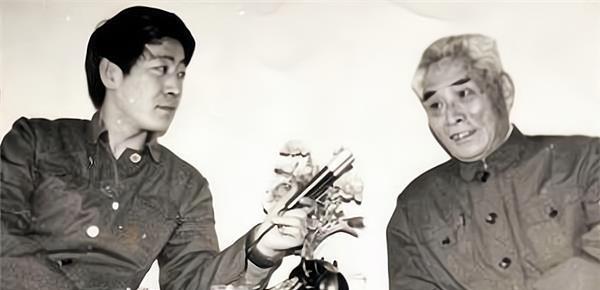Huang Wei was a very unusual prisoner of the Gongdelin War Criminals Management Center, and after entering the War Criminals Management Center, he behaved very stubbornly, and every time he said reform, he directly refused, not only that, he also refused to admit any crime of his own. Not only that, but his means of refusing to reform are very numerous, which makes many people feel headaches for a while.
In order to allow die-hard war criminals like Huang Wei to be reformed, the state has even organized some special visits to change their thinking. It is just that these senior Kuomintang war criminals did behave differently when they visited various construction achievements after the founding of New China.

In 1965, Huang Wei also became a member of the construction achievements after the founding of New China. Huang Wei visited the construction of Shanghai, and during this period, he met his youngest daughter Huang Huinan, whom he had never seen before, and after seeing his daughter, he was very surprised and did not dare to think that in just a few decades, Shanghai had been built so brilliantly.
However, after visiting Shanghai, Huang Wei made a request to the state, he wanted the state to send him a truck, he hoped that he could visit a place alone. When the staff of the party organization asked him why he wanted to go to this place, Huang Wei's statement surprised them.
Huang Wei said that because he had thousands of brothers buried here, and since he had now passed through Shanghai, he wanted to see his brothers. So what is the reason why there are thousands of people buried in this place of Luodian?
In fact, all this happened at the time of the Luodian Scramble, which was part of the Battle of Songhu, and this war was also Huang Wei's battle for fame. Before that, Huang Wei had been sent to Germany by Chiang Kai-shek to study, and he specialized in studying German military, in this series of systematic studies, Huang Wei's talent was stimulated to the greatest extent.
Subsequently, Chiang Kai-shek recalled Huang Wei in advance, and in this way, Huang Wei joined the Luodian Scramble. Although Huang Wei had just returned to China, he was the commander of the 67th Division as soon as he returned, and he also went directly to Luodian.
In the Battle of Luodian, both the Kuomintang and the Japanese army invested a large number of troops to fight for this small place, and throughout the early stage of the War of Resistance Against Japan, the Battle of Luodian was also known as the "Flesh and Blood Mill". After huang Wei recalled the battle of Luodian, he felt that the soldiers who went to the battlefield at this time were more like targets, because they had not received any professional training, so the casualties were very large.
After understanding the situation, Huang Wei taught the fighters how to learn the correct shooting posture in his spare time to minimize casualties. In the entire Battle of Songhu, especially Huang Wei's 67th Division suffered the greatest casualties, and even in the later stages of the war, even the clerks, cooks, etc. had personally gone to the battlefield.
Of course, when cleaning up the battlefield afterwards, Huang Wei found that his soldiers were actually less than one regiment alive in the end. Even so, he led these people to hold out in Luodian for a week, blocking the pace of the Japanese army's continued advance, and even more crushing their delusion of annihilating China for three months.
Huang Wei's Battle of Luodian also brought encouragement to the Kuomintang army, and after this, the Nationalist government publicized Huang Wei's anti-war deeds on a large scale. Since then, Huang Wei has become a famous young general, and even more a famous anti-Japanese hero.
Although Huang Wei had a lot of victorious wars, what no one expected was that in the final Battle of Huaihai, he was defeated and captured. After being captured, Huang Wei became a war criminal and entered the Gongdelin War Criminals Management Center, where he remained for 27 years until he was released in 1975.
Huang Wei was an old man in prison in 1965, but despite this, he did not forget the group of brothers who accompanied him decades ago. For this reason, when he went to Shanghai to visit, he proposed to the organization that he wanted to go to Luodian to worship.
Many people were touched by his request, after all, it was 20 years after the victory of the War of Resistance. After layers of approval, Huang Wei's request was finally approved, and when he set foot on the land of Luodian again, Luodian had already been built into a way he could not imagine.
Conclusion: In fact, there are many people in the whole war that we cannot judge by position, because what they think is often their own camp is correct, and these are only personal choices. In addition to looking at history, we should think about why they have such thoughts, and in addition, we should also study their own merits.